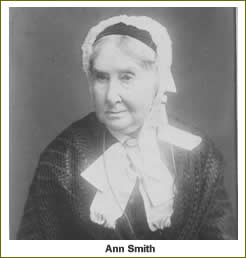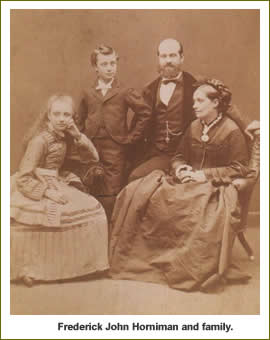Contrary to present day opinion, the British have not always been a nation of tea drinkers, but since we adopted the habit we’ve become quite enthusiastic about this beverage! Perhaps it was a liking for tea that encouraged me in my search for the origins of The Horniman Tea Company.
I first became aware of the name Horniman in connection with my family history research, when I received a copy of the marriage certificate for my great-great grandparents, Charles Henry Buck and Mary Smith, dated 26th October 1858. I was so surprised that the marriage had taken place in a register office rather than at a Quaker Meeting, that at first I didn’t take in the names of the witnesses, one of whom was, ‘John Horniman’. As the name was familiar, I asked my mother if she knew who he was. ”Oh, that will be the Quaker tea merchant” she replied. Excited by the idea that John Horniman might be THE tea merchant, and that this man seemed to have a connection with our family, I delved further.

Research revealed that John was born on 4th December 1803 at Reading in Berkshire. He was the last child of Thomas Horniman, an umbrella maker, and his wife Hannah, nee Brewerton. They converted to Quakerism a few years after their marriage and following this. John and his only surviving brother, Robert, were educated at Ackworth School in Yorkshire.
The link with my family was first made following the deaths, in 1817, of my 4x-great-grandmother, Hannah Smith, and John Horniman’s father, Thomas Horniman. On 28th October 1819 my 4x-great-grandfather, widower Thomas Smith, married widow Hannah Horniman at Reading, Berkshire. On 15th December 1825, John Horniman married his step-father’s daughter, Ann Smith, following in the footsteps of his brother, Robert Horniman, who had also married one of his step-father’s daughters, Hannah Smith, in 1821.
Upon the completion of their education Robert and John Horniman became involved in the grocery trade. They are recorded as general grocers and cheesemongers in various trade directories. Robert and his family moved to Exeter where he and two of his children died in a cholera epidemic in 1832. This left the destiny of this branch of the Horniman family firmly in the hands of John, being the only remaining son.
After his marriage in 1825, John was intent on building up his grocery business. He travelled widely in the south of England. I have traced business records for him at Northampton, Reading, Warborough in Oxfordshire, North in Warwickshire, Bristol, Birmingham, Bridgewater in Somerset and Tottenham Court Road, London. He also attended Quaker Meetings in most of these towns. During this period the couple had six children, four of whom died in childhood. This left two sons, William Henry and Frederick John, who might grow up to continue in their father’s business.
It is well documented that Horniman’s tea was the first company of its type to begin selling tea in sealed packets in about 1826.
It may be true that John Horniman started a trend, but the date seems unlikely. It was only after 1845 that John is recorded as a tea merchant and this new business began in the perhaps unlikely setting of Newport on the Isle of Wight. For the first time John brought a partner into his business: Job Smith just happened to be his brother-in-law, and also my 3x-great-grandfather. Job had been widowed in 1841 and had moved from his native Oxfordshire, presumably in order to become involved in his relative’s new venture.
Things did not begin well. In June 1846 a piece appeared in the local newspaper:
“On 20 June 1846 information was laid against John Horniman at the County Petty Sessions for having sold tea (through Job Smith) at West Cowes, Isle of Wight, “without being legally licensed for so doing”. A witness stated, “Smith generally takes two baskets about the place with parcels of tea in them” and he “had frequently seen the name Horniman on the cart”.”

The tea business continued in quite a small way for about eight or nine years. During this period John Horniman continued his grocery business in other towns, but the number of entries in trade directories began to diminish and also some of his premises were advertised for sale in The Times newspaper. It seems he was beginning to polarise his business ventures.
During the late 1850s the Lancet magazine produced a series of articles regarding its campaign against the adulteration of food. The editor, Thomas Wakely, arranged for food samples from various sources to be tested for their purity. Horniman’s Tea was extremely highly praised as passing the tests in “triumphant fashion”!
This particular article and the subsequent publicity for the Horniman name resulted in huge growth for the Horniman Tea Company. Wakely’s campaign resulted in the passing of the Food and Drugs Act in 1860.
At the start of 1854 John Horniman’s partner, Job Smith, decided it was time to move on. Whilst living on the Isle of Wight he had remarried and he and his new family sailed for America. I don’t believe there was any sort of acrimonious break-up of the business partnership as John and Job continued to be in contact for the next twenty years until the death of Job Smith in Iowa in 1875. I do wonder if Job Smith regretted his untimely departure as he read about the success of his old business partner!
At about the same time Job Smith left England for the United States, John Horniman and his wife and two sons moved to Croydon, Surrey. They owned two properties over the years in Croydon. The second of these was named Coombe Cliff House and would be the Hornimans’ home for about forty years.
By 1860 trade was really booming and Hornimans Tea was sold with all sorts of advertising slogans, including the title of this article. Free samples were also posted out by return if one wrote to the warehouse at Wormwood Street, Bishopsgate, London.
As John Horniman approached his 60s he must have thought about passing the business to his sons, William Henry (1831-1900) and Frederick John (1835-1906). The business was styled with their initials, ‘W.H. & F.J. Horniman’, but only Frederick John Horniman took an active part in the tea trade. In 1869 John Horniman retired from business and was replaced, in partnership with Frederick John, by Samuel Robert Brewerton, grandson of John’s uncle, Richard Brewerton.
In retirement, John Horniman devoted his energies and wealth to philanthropic work. He was a supporter of Evangelistic missions and schools both in England and abroad. He established a training institution for Quaker missionaries and set up a convalescent home in Worthing, Sussex for children from poor areas of London, endowing it with a large sum of money for its permanent maintenance. He was a member of the committee of the Peace Society and a patron of, amongst others, the London Temperance Hospital, the Anti-Slavery Society and the Howard Association for penal reform.
During the 1870s and 1880s John and Frederick John travelled a great deal. They were interested in gathering curios and antiquities from every corner of the globe in the best Victorian tradition. Eventually the collection they amassed, which was stored at the home of Frederick John in London Road, Forest Hill, Kent, became so large that Frederick John’s wife, Rebekah, pronounced that either the collection would have to go, or she would! This ultimatum encouraged Frederick John to build another property close by, into which he moved his family. The old house was converted into a museum of artifacts and was the forerunner of the Horniman Museum that continues today.
In 1889 the company was incorporated and styled ‘W.H. & F.J. Horniman Ltd’. William Henry Horniman still took no part in the business. Sadly he was certified a lunatic in November 1890 and lived out the rest of his days at Torquay, Devon, where he was looked after by two attendants and had regular visits from his aging parents. He died in 1900, never having married.<
On 12th August 1893 John Horniman died at his home Coombe Cliffe Lodge at Croydon, in his ninetieth year, after over 67 years of marriage

The extent of John Horniman’s fortune became apparent on examination of his will. The value of the estate was assessed at £313,775-10s-4d. There is a complex list of bequests extending to quite distant relatives. In total about forty families benefited from the will. There were also bequests for servants and old friends.
Large sums were bequeathed to various associations and societies. A total of over £90,000 was divided between: The Peace Society, The Friends’ Foreign Mission Association, The Friends’ Syrian Mission Committee, The Friends’ Home Mission Committee, The Friends’ Temperance Union, The Morovian Missions, Dr Barnardo’s Homes and Mission, The North Eastern Hospital for Children in Hackney, The London Temperance Hospital, The Howard Association, The Kingston Monthly Meeting of the Society of Friends’ and the Salvation Army Social Wing. This was a vast fortune in those days, but there was still plenty to help the business progress through the next generation and enable Frederick John Horniman to fulfill his ambition of becoming a Member of Parliament and he represented Falmouth as a Liberal during the 1890s.
Frederick John Horniman was married twice, to Rebekah Emslie in 1859 and to Minnie Louisa Bennett in 1897, and had two children by each marriage. The first two children became prominent in society:
Emslie John Horniman (1863-1932) was a director of the tea business and also an M.P. for Chelsea for many years. In 1911 he laid out nearly an acre of land in a poor part of Chelsea as a public garden and presented it to the London County Council. Today this is called ‘Emslie Horniman’s Pleasance’ at Bosworth Road, London W10. It was whilst Emslie John was a director of the tea company that it was bought out by J Lyons & Co in 1918. However, the Hornimans remained directors of the firm for several more decades.
Emslie’s sister was Annie Elizabeth Fredericka Horniman (1860-1937). She became involved in the theatre: a turn of events not approved of by her family, but she went on to introduce the first plays of George Bernard Shaw to London and promoted the work of W. B. Yeats and other Irish playwrights. She founded the Abbey Theatre in Dublin for them and, principally through the Gaiety Theatre in Manchester, was largely responsible for the introduction of the Repertory Theatre movement in England. She was also an ardent suffragette. Annie was made a Companion of Honour for theatre work in 1933.
Through all of this, little mention has been made of Ann Horniman, John’s wife. She must have been very supportive of her husband, particularly in the early years as he established his business. I spent many months trying to trace her death. Being that Ann was three years her husband’s senior, and as he had died in his ninetieth year and she had survived him, I assumed she might have died within a year or two of 1893. Not so; she is currently the longest surviving person on my family tree, living until she was one hundred years of age. Had Ann been born three months earlier she would have seen three centuries, her terminal dates being, 27th March 1800 to 20th July 1900. Ann was laid to rest at the Friends’ Burial Ground at Croydon where her husband had been buried in 1893.
So, next time you sit down for a cup of tea, remember it was Quaker, John Horniman who was the first to make this commodity safe to drink!
Merry Monty Montgomery
© Merry Monty Montgomery 2007